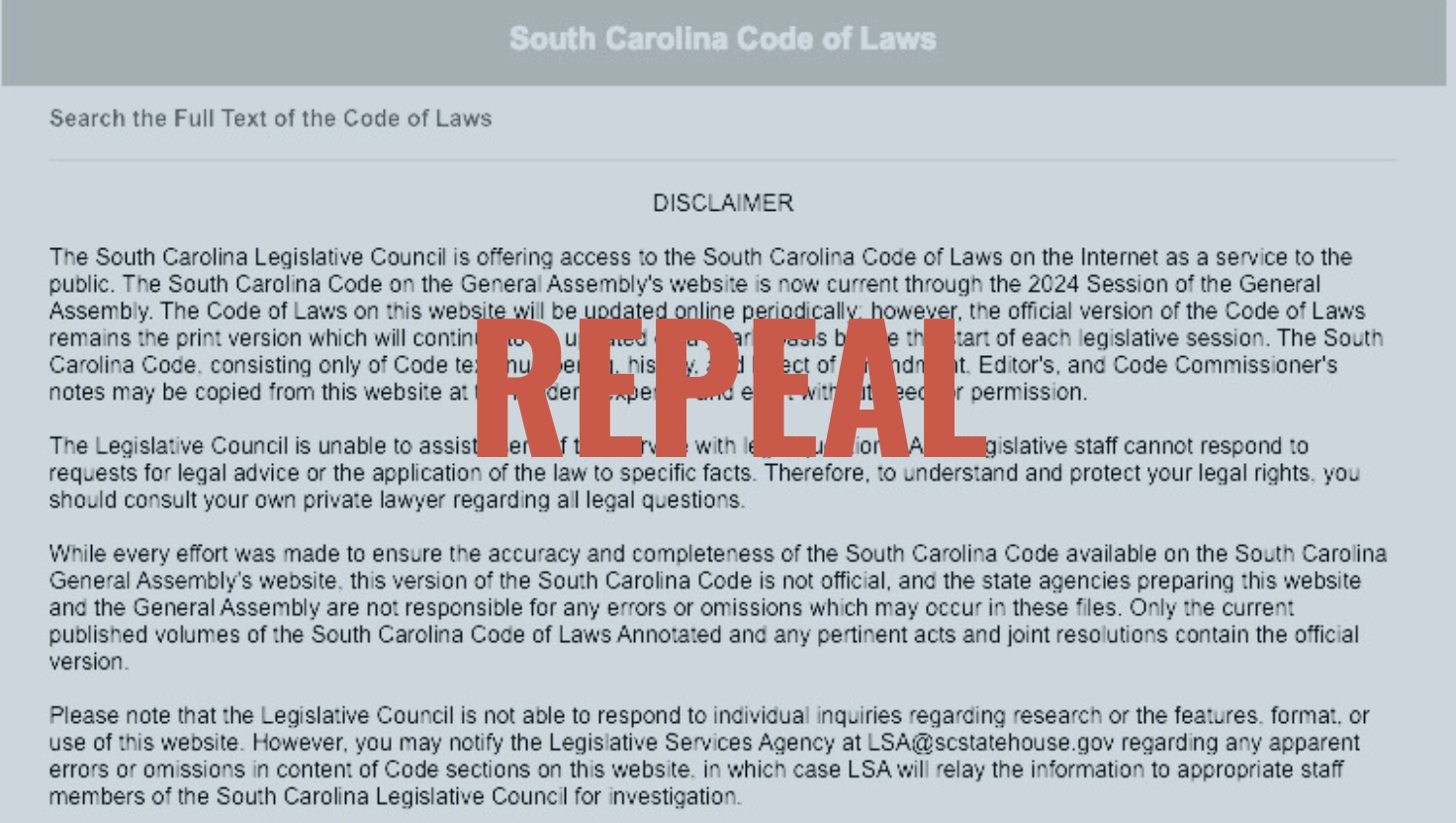Something uncomfortable needs to be said, and the discomfort comes from challenging what many South Carolinians now accept as normal. These days, supporting your legislator means cheering them on as they draft yet another law to fix whatever issue the media has pushed to the top of the pile. South Carolina has no shortage of problems, so when infrastructure fails, we demand new legislation. When education keeps falling short, we call for new standards. When medical care disappoints or leftist ideology creeps into classrooms, the response is always the same: pass a law to fix it. Naturally, when people are trained to lobby for new laws, legislators reach for the tool they know best.
Then again, lawmaking is their title and part of their job description. Legislators campaign on promises to fix problems through legislative action, and voters reward them for appearing busy with bill after bill. This cycle feels logical on the surface. Lawmakers make laws, and we are led to believe issues are getting solved. Dare to question that pattern and it’s viewed as an act of betrayal.
Yet here’s where we need to pause and remember when they told you to put on your thinking cap? That simple mental exercise helped young minds focus by blocking out distractions and zeroing in on the task at hand. The thinking cap created space for genuine reflection, rather than knee-jerk reactions. We need that same focused thinking now because the question demanding our attention cuts against conventional wisdom.
When did we decide that legislators exist solely to create new laws? The title “legislator” indeed suggests lawmaking, but there’s another side to their authority that modern politics seems to have forgotten. But before we reveal it, let’s first examine exactly why we need this forgotten authority.
We’re drowning in an ocean of laws, thousands upon thousands of regulations that govern how we educate our children, conduct business, build our homes, practice our professions, and even operate small farms. We have too many laws! It’s astonishing how many laws exist that, if you were to approach any South Carolinian and ask them to explain the laws that govern their daily lives, don’t be surprised if you see their face transform as if you’ve just asked them to navigate a maze with no map. The confusion is real, especially when every citizen must follow laws they’ve never read, understood, or even known existed. We’ve created a system where ignorance of the law is no excuse while simultaneously making comprehensive knowledge of the law humanly impossible. The result is a population that is most likely breaking the law and hoping no one decides to notice.
It’s time to reveal a part of a legislator’s authority that’s long been forgotten. Instead of cheering them on to pass another law, what if we demanded that our legislators review the code of laws, pick one that relates to a constant issue plaguing South Carolina, read that law to determine if it’s actually enabling the problem, and then do something revolutionary: repeal it. What if we stopped making lawmakers and started making repeal makers?
Yes, we need repeal makers as soon as possible!
This should be the norm. There was a time when most people understood that legislators exist to protect life, liberty, and property. Protection means ensuring government doesn’t hijack the paths that foster these fundamental rights. The founders were keenly aware that government poses the greatest threat to individual freedom, which is why legislative power should focus on removing barriers to human flourishing. If you think this is an exaggeration, take a look for yourself. Visit scstatehouse.gov and click on the SC Code of Laws. You’ll be confronted with a list that reads Title 1, Title 2, Title 12, Title 13, all the way through about sixty-three titles. You might think sixty-three titles sounds manageable until you click on one title and discover what you’re really facing. Sub-lists of chapters appear, and within each chapter lies a shocking revelation of thousands of codes, each one filled with confusing language and each one carrying the force of law. The situation grows worse when you realize that laws spawn regulations, and regulations carry the same legal weight as the statutes that birthed them.
Legislators will have you believe that repealing a law is too complicated for regular people to understand. They’ll say it involves legal complexity, leadership hurdles, and procedural dead ends. But that argument falls apart when you look at how easily they pass new laws. If passing a law is so simple, it happens by the hundreds every session, why is repeal treated like an impossible task? The truth is, repealing bad laws should be easier than creating new ones. That’s basic logic. If something isn’t working, remove it. Yet leadership continues to claim that repeal is too hard, while they expand the code without hesitation.
Ask yourself, when was the last time the legislature devoted real time to reviewing and repealing laws that no longer serve the public or are unconstitutional? Hold up, let’s be fair. Legislators do repeal laws from time to time. But it’s rarely because those laws were harmful or unnecessary. It’s usually because they want to make room for something worse.
The rarity of meaningful repeal efforts signals a system more interested in accumulating power than solving problems. And yes, we understand that to repeal a law, you need to file a bill that can quickly become something worse, so there are risks involved. These dangers shouldn’t paralyze us into inaction but rather inspire careful vigilance throughout the legislative process. Don’t you think it’s time we gave it a try?
The thinking cap exercise serves us well here. Sometimes the best solution involves subtraction rather than addition. South Carolina deserves legislators brave enough to wield both sides of their constitutional authority.
Now, instead of your thinking cap, put on your dream cap. Close your eyes. Imagine South Carolina operating under fewer, clearer laws that ordinary citizens can actually understand and follow. Picture legislative sessions where lawmakers focus on removing barriers with the same energy they bring to writing new rules. Envision a government that protects freedom by stepping aside instead of micromanaging every detail of daily life. That kind of vision depends on legislators willing to be repeal makers. Leaders who know when to say no, when to step back, and who understand that removing a law often does more good than writing a new one.
Disclaimer: The views expressed in this article are those of the author and do not constitute legal or professional advice. ConservaTruth assumes no liability for any actions taken based on this content. Read more.

Subscribe to ConservaTruth's Email Newsletter for curated insights on South Carolina's legislative activities and conservative viewpoints, delivered straight to your inbox! With vetted and easy-to-understand information, our newsletter empowers you to become an informed and engaged citizen, actively participating in safeguarding our cherished Constitutional values. Don’t miss out on crucial updates—join our community of informed conservatives today!





Comments